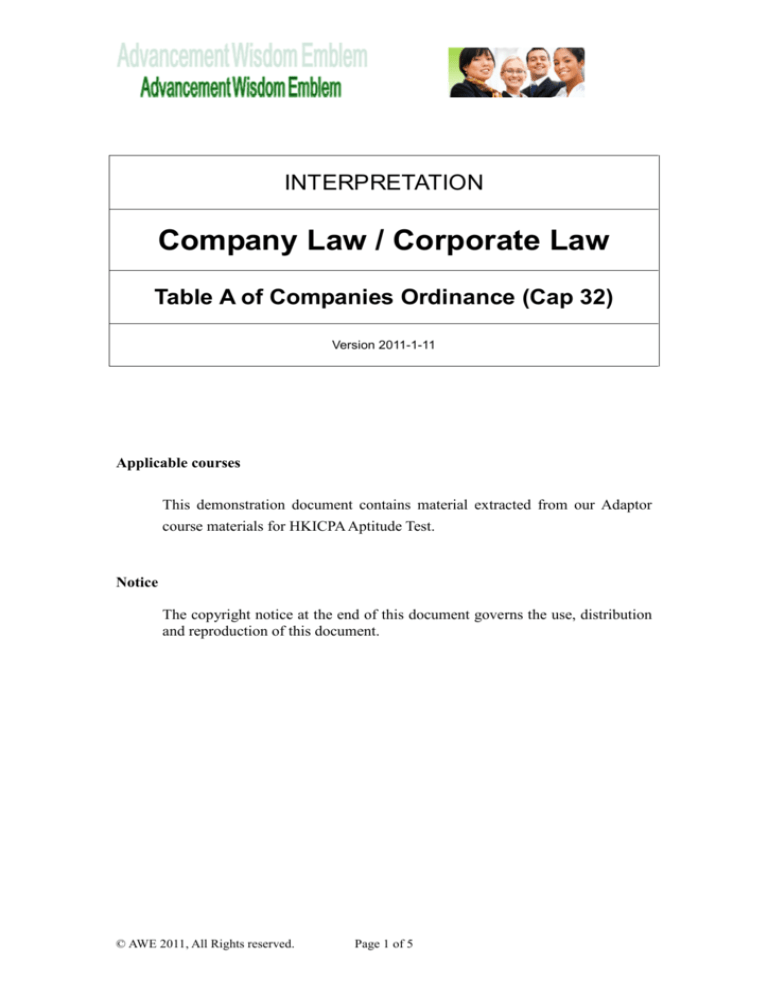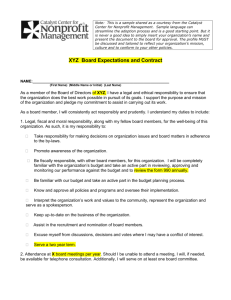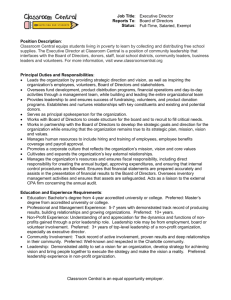
INTERPRETATION
Company Law / Corporate Law
Table A of Companies Ordinance (Cap 32)
Version 2011-1-11
Applicable courses
This demonstration document contains material extracted from our Adaptor
course materials for HKICPA Aptitude Test.
Notice
The copyright notice at the end of this document governs the use, distribution
and reproduction of this document.
© AWE 2011, All Rights reserved.
Page 1 of 5
Demo interpretation
This analysis is for demonstration purposes. Our students receive a much
fuller version of this extract.
The demo interpretation covers only articles 77 to 89 of Table A and gives a
mini-conclusion. The full version for our students analyses the whole Table
A article by article with a fuller conclusion.
The demo analysis presented here is not readily available anywhere else
other than from AWE.
What is Table A?
Table A is a schedule of the Companies Ordinance (Cap 32). Examiners
invariably set corporate/company law questions in this area.
As a rule, textbooks on company/corporate law do not cover Table A well or
with much effort.
Table A used here is as stated on 1 November 2009 in the Companies Ordinance
(Cap 32).
Interpretation A
Directors
Article 77. The first director will be determined by the founders of a company.
Article 78. The remuneration of the directors shall be determined by the general
meeting. The company can also reimburse the expenses paid by the directors.
Article 79. The share qualification of the directors may be fixed by the general
meeting.
Article 80. A director may become a director or interested in any company
promoted by the company. In such circumstance, the director shall not be
accountable to the company for any remuneration or other benefits he received
from the interested company.
© AWE 2011, All Rights reserved.
Page 2 of 5
Interpretation A mini-conclusion
The first director is determined by the founders. The remuneration and share
qualification of them shall be determined by the general meeting. The directors
are not required to account for any benefit he received from the interested
company.
Interpretation B
Borrowing Powers
Article 81. The directors can exercise all the powers of borrowing for the
company provide that the amount of debt cannot be exceeded the nominal
amount of the share capital of the company unless it is approved by the general
meeting.
Powers and Duties of Directors
Article 82. The directors can exercise all power of management to the company
but are subject to the special resolution passed by the general meeting. Such a
resolution cannot invalidate any prior act done by the directors.
Article 83. The power of management of the company may be delegate by the
others.
Article 84. The directors can use the company seal outside Hong Kong. [See s.
35 of Companies Ordinance (Cap 32) for details.]
Article 85. The directors have power to keep the branch register, subject to
section 103, 104 and 106 of Cap.32 with the variations as the directors think fit.
© AWE 2011, All Rights reserved.
Page 3 of 5
Article 86. [Prohibits directors from having personal interests in any contract
or arrangement with exceptions. Following summarises the sub-articles.]
(1) [Art. 86(1) repeats s. 162 of Companies Ordinance (Cap 32).]
(2) [Art. 86(2) prohibits directors from voting on any contract or
arrangement that they have an interest in, except those interests that are
beneficial to the company.]
(3) [Art. 86(3) allows a director to hold any other office or place of profit
under the company in conjunction with his office of director.]
(4) [Art. 86(4) provides that a director may hold office in another company if
his own company allows it.]
(5) [Art. 86(5) allows company directors to also be professionals of their own
companies and receive remuneration for that, but not be auditors of their own
companies.]
Article 87. The directors have full powers, subject to the resolution passed, to
deal with negotiable instruments.
Article 88. The directors should keep the minutes which is specified:
(a) the appointment of directors.
(b) the names of directors present at each meeting.
(c) the resolutions and proceeding passed in a meeting.
Article 89. The directors can pay remuneration or allowance or pension etc to
the other directors or their spouses and dependants for the company.
© AWE 2011, All Rights reserved.
Page 4 of 5
Interpretation 2 mini-conclusion
Directors have full power to manage their companies but the power is
controlled by special resolutions passed by company general meetings.
Directors’ powers can be delegated to others. Additionally, directors are entitled
to use the company seal outside of Hong Kong, to keep a branch registers and to
deal with negotiable instruments.
***
© AWE 2011, All Rights reserved.
Page 5 of 5
Our Adaptor course will show you the remaining parts of
this analysis.
Your lecturer will also show you how to answer questions
related to Table A in your professional examination, for
example:
ACCA Paper 2.2, June 2007 diet, Q7
P C Law, May 2009, Q7
HKICS Corporate Law, December 2009 Q1 (j)
Copyright © AWE, 2011. All Rights reserved. No part of this publication may be used or reproduced or
stored in a retrieval system in any manner or form whatsoever without written permission from AWE.
Disclaimer
Errors and omissions excepted. This document is for demonstration purposes and comes with no
expressed or implied suitability for any particular purpose.
AWE materials may be purchased for educational, business or sales promotional use. For information,
please write to: Special Markets Department, AWE, Unit 1518, 15th Floor, Fortune Commercial
Building, 362 Sha Tsui Road, Tsuen Wan, Hong Kong. Telephone (+852) 3562 3369. Fax (+852) 8265
© AWE 2011, All Rights reserved.
Page 6 of 5
7438. Email: enquiries@awe.com.hk. Website: http://www.awe.com.hk.
© AWE 2011, All Rights reserved.
Page 7 of 5









